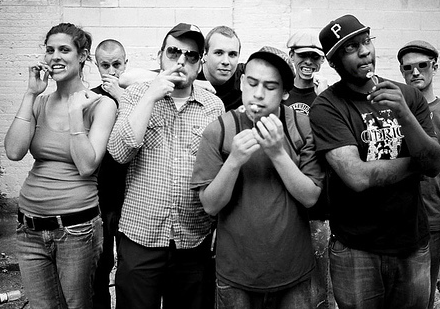How do you manage the demands of your solo work on top of creating and performing as Doomtree? Where do you find the time?
Lazer Beak: There's no time. We're on day 30-something of the tour, and sometimes that's more than one performance or appearance a day. I guess we could create on tour, but Cecil is the only one who actually does.
Dessa: It's mostly divided into creative time and performance time. We locked ourselves away in a cabin to make No Kings, scheduled the whole thing on a day planner.
Lazer Beak: The lyricists wrote the album in five days.
P.O.S.: No Kings is our first real collaborative album. It typically takes a lot longer. The others were more like compilations, and we wanted them to be. But this is something different, we're less concerned with making sure everyone gets the exact same number of bars.
No Kings is clearly a political album, but it's not corny in the way that so-called conscious hip-hop can be. How does politics play into what you do?
Dessa: I think everyone would probably give a different answer. We're definitely not doing commentary. Sometimes I think we're received as more of a “political” group than we are.
P.O.S.: It's not like electoral—
Mike Mictlan: We're not doing Rock the Vote.
P.O.S.: Right, it's more about attitudes: what's fair, what's unfair. But we all listen to and enjoy dumb music too, it's not just heavy stuff.
One place where you do get prescriptive, both in your individual and group music, is calling other folks out for lacking originality. With more and more outlandish hip-hop getting mainstream attention, do you think that's changing?
P.O.S.: We have a situation where people are making more interesting music and release it free on the internet, but at the same time we're still bombarded--
Dessa: There's still an over-representation of pablum.
Mike Mictlan: There's always been originality out there. When I wrote the hook to “Bangarang,” I was talking about the sort of pop-rap that gets shoved down our throats.
What's some music you're listening to now? Not in terms of inspiration, just stuff you like the sound of.
Cecil Otter: I've been listening to a lot of Fever Ray, and that M83 album everyone likes so much.
Dessa: We have really diverse tastes, but we listen to a lot of Minnesota stuff, not just because we're from there, it's really good. There's the Bon Iver connection. There's that guy Gotye.
P.O.S.: I've been listening to that Fever Ray too, the new Fucked Up too. But when we're on tour I mostly make everyone listen to a lot of podcasts. Podcasts all day.
Lazer Beak: I love Drake. Seriously, I really do.
Mike Mictlan: Great, now that's going to be the headline: “Doomtree Loves Drake.”
There's a lot about kids and childhood in your songs, when you're writing, are you thinking about the demographics of your audience?
Dessa: I can't say I'm not aware of our demo, but the writing is from experience not for someone to receive it a particular way. I'm looking for the best way to tell the story, and maybe a kid connects with it in their bedroom and maybe not. After a concert once I had a girl come up to me, and she had some stupid haircut or something so I had her written off in my head, but she comes up and says something really intelligent. I think they actually connect with the music when I'm not there at all.
P.O.S.: If I find myself thinking about how a certain line is going to be received, it's time to tear out the page and start over. Just can't get started with that.
Dessa, in “Alibi” there's this moment when you finish a line that starts “99 problems” with this exasperated, cutting “argh!” but in the version for Castor it's a lot softer. Why… Dessa: Why did I do that?
Yeah. I'm assuming it isn't because it got a lot easier to be a woman in hip-hop between the recordings.
Dessa: Well first I'm a little self-conscious, it's one thing to groan through a soundboard, it's another to do in front of a mandolin. Only one was done touring with a live band, which makes a difference. I'm not really a fan of live hip-hop, you lose a lot of sonic diversity. I don't have the best percussive rhythm as a writer, but I think as a lyricist I can hold my own with anyone. With the live instrumentation you can hear the words better.
P.O.S.: And you get to sing more.
Dessa: And I get to sing more. It's part of my finding myself as a performer. But saying the same words nine months later, you say them a little different, you come at a bit of a different angle, and you hope that a bit of that anger has cooled.
